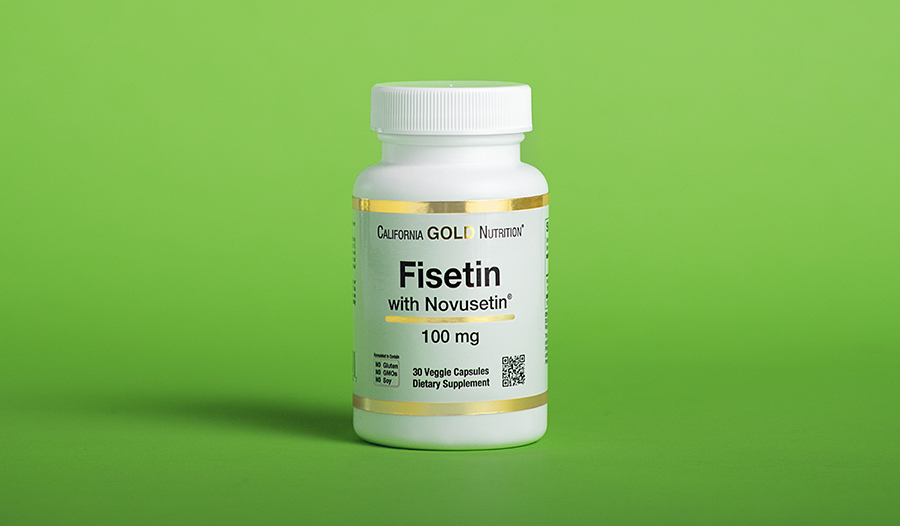Have You Heard of Fisetin? This Antioxidant May Have Brain and Memory Benefits

There is no shortage of natural compounds that impact brain health. After all, the brain is the most active tissue in the body.
One of the most exciting compounds in nature is flavonoids, a class of compounds referred to as “nature’s biological response modifiers.” These compounds are primarily responsible for the colors found in many fruit, flowers, and other plants. They are critical to the health of plants, and they appear to be essential to human health as well.
Over 8,000 flavonoids have been identified. And although they share many essential functions as increasing antioxidant mechanisms, fighting aging and cellular degeneration, and exerting beneficial effects on the cardiovascular system, there are subtle differences in how different flavonoids work in the human body.
What is Fisetin?
Fisetin is one of the most deeply investigated flavonoids.1 Technically speaking, fisetin is a flavonol molecule similar to those found in dark chocolate and cacao. Fisetin is found in tiny amounts in particular fruits and vegetables.
Strawberries, by far, have the highest content and are followed by apples. The amount of fisetin is roughly five times the level found in apples and generally more than thirty times the level found in mangoes, kiwis, grapes, tomatoes, onions, cucumbers, and various nuts.
However, the amount of this fisetin in these foods is insufficient to provide the amount of fisetin found in dietary supplements. The estimated daily intake of fisetin in Japan is 0.4 mg per day. The daily recommended dosage for fisetin as a dietary supplement is 100 mg per day.
Health Benefits of Fisetin
Consistent with other flavonoids sources like quercetin, resveratrol, and grape seed extract, fisetin exerts a myriad of beneficial effects. The focus of this article will be on fisetin’s unique effects on brain health, cognition, and memory.
Fisetin promotes brain health by:
- Activating antioxidant mechanisms to protect brain cells from damage.
- Increasing glutathione content in brain cells to further protect the brain and also to promote detoxification and enhanced cellular energy.
- Supporting the growth of new brain cells.
- Stimulating improved brain circuitry and signaling pathways associated with long-term memory function.
Much of the research on fisetin on brain health has been conducted at the prestigious Salk Institute for Biological Studies in San Diego and has focused on fisetin as a “nootropic” and “neurotrophic factor.” The term nootropic is a substance that can enhance memory and brain function. Several other natural compounds that exert this effect include lion’s mane extract, PQQ with CoQ10, resveratrol, and curcumin.
What sets fisetin apart is its action as a neurotrophic factor. These sorts of compounds support the survival, differentiation, and functional maintenance of brain cells. In other words, fisetin is a bit different in that in addition to helping brain cells function better; as a neurotrophic, fisetin plays a role in improving what is known as “brain plasticity.”
Brain plasticity refers to the brain’s ability to respond to develop new or restored brain circuitry. Brain plasticity is significant for brain functions like learning and memory to work correctly. So, by acting as a neurotrophic to improve brain plasticity, fisetin is able to actually lead to the formation of improved brain circuitry and signaling pathways associated with long-term memory function.
Of all of the flavonoids tested in the full range of animal models for age-related brain changes, only fisetin and a related minor flavonol were shown to be effective.2
How Does Fisetin Work?
Fisetin can cross the blood-brain barrier to work through a very complex set of mechanisms to produce its effects as a nootropic and neurotrophic agent. And, again, fisetin’s actions are a bit different than other compounds, but it does share many actions with other flavonoids. For example, fisetin shares some anti-aging properties with resveratrol. It also is an effective senolytic agent, which means that it helps the body and brain get rid of old cells to produce a “pruning” effect in allowing healthier cells to flourish or replace the old cells. Fisetin has roughly twice the effect in this capacity as quercetin.
Like other flavonoids, fisetin also increases glutathione production, the key antioxidant and detoxifying agent in our cells. Increasing glutathione levels in the brain produce all sorts of benefits as the brain is better able to protect itself from damage and has higher cellular energy levels.2
One of the critical actions of fisetin is activating what is known as the ERK pathway.3 ERK stands for “extracellular signal-regulated kinases.” Extracellular means outside the cell, and kinases refer to a class of enzymes. The ERK is when something outside the cell signals the inside of the cell to activate the kinase enzymes.
Fisetin helps brain cells start to produce proteins that are critical to brain cell structure and function, especially at the communication junctions known as synapses between the cells. It also reduces various markers of inflammation within the synaptic connections.
By activating the ERK pathway, fisetin can improve brain cell structure and function. What this translates to is improved cognition and memory. This effect has repeatedly been demonstrated in pre-clinical studies.2,3
What is the Dosage Recommendation for Fisetin?
There are only two human studies with fisetin, and both used a daily dosage of 100 mg.5,6 This dosage was calculated from a considerable amount of animal data showing efficacy and safety that allows for calculating human dosage based on United States Food and Drug Administration guidelines.
NOTE: Novusetin® is a premium extract of fisetin derived from the Japanese Hazenoki wax tree (Rhus succedanea).
References:
- Khan N, Syed DN, Ahmad N, Mukhtar H. Fisetin: a dietary antioxidant for health promotion. Antioxid Redox Signal. 2013;19(2):151-162.
- Maher P. How fisetin reduces the impact of age and disease on CNS function. Front Biosci (Schol Ed). 2015 Jun 1;7:58-82.
- Maher P, Akaishi T, Abe K. Flavonoid fisetin promotes ERK-dependent long-term potentiation and enhances memory. Proc Natl Acad Sci U S A. 2006;103(44):16568-16573.
- Small GW, Siddarth P, Li Z, et al. Memory and Brain Amyloid and Tau Effects of a Bioavailable Form of Curcumin in Non-Demented Adults: A Double-Blind, Placebo-Controlled 18-Month Trial. Am J Geriatr Psychiatry. 2018;26(3):266-277.
- Wang L, Cao D, Wu H, Jia H, Yang C, Zhang L. Fisetin Prolongs Therapy Window of Brain Ischemic Stroke Using Tissue Plasminogen Activator: A Double-Blind Randomized Placebo-Controlled Clinical Trial. Clin Appl Thromb Hemost. 2019 Jan-Dec;25:1076029619871359.
- Farsad-Naeimi A , Alizadeh M , Esfahani A , Darvish Aminabad E . Effect of fisetin supplementation on inflammatory factors and matrix metalloproteinase enzymes in colorectal cancer patients. Food Funct. 2018 Apr 25;9(4):2025-2031.
DISCLAIMER:This Wellness Hub does not intend to provide diagnosis...
















































































 Table of Contents
Table of Contents
















